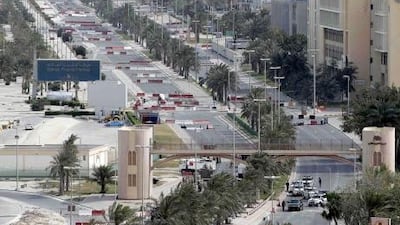An exodus of office workers from Bahrain was under way yesterday as international banks evacuated staff to Dubai and further afield.
Dozens of workers at international companies left as blockades on the kingdom's financial centre forced the stock market to shut down.
Most financial firms with offices in Bahrain, including Citigroup, HSBC, BNP Paribas and Standard Chartered, have temporarily closed or scaled back operations in recent days. Employees not leaving the country are being told to stay at home.
______________________________
More: Bahrain carrier cancels service
More: Hoteliers attempt to counter Bahrain unrest
Analysis: Bahrain's business ambitions take a hit
______________________________
The stock exchange was also closed for trading yesterday as the kingdom declared a three-month state of emergency. The Bahraini market had been operating from emergency premises since Sunday.
Thousands of protesters and a strong military presence blocked access to Financial Harbour, where many banking companies are located.
"The international banks are saying [to employees], if you want to go, go, and if you don't, stay at your own risk," said Anthony Dariane, who works at Credit Agricole's corporate and investment banking division in Bahrain.
"I'm the only foreigner still here," Mr Dariane said from his home in Manama yesterday. Ten employees and their families had relocated to the Dubai back-up office, he said.
"For the time being, all of the international banks have closed their offices and people are going to the closest place, which is Dubai," Mr Dariane said.
A Citigroup banker in Dubai, who wished to remain anonymous, said several co-workers flew to the emirate on Tuesday evening and yesterday.
Citigroup has back-up offices in Dubai and India, and a spokesman for the bank said "critical business" was continuing, despite the tensions.
Standard Chartered and HSBC said that employees were "safe" and that the situation was being closely monitored.
"As of now, all banks and all private and government entities are closed," Nabeel Ali, a senior vice president and head of institutional banking at Unicorn Investment Bank in Bahrain, said yesterday. "There is no life. Bahrain is a war zone. People are being shot. We are stranded at home and are just watching the news. The latest communication is stay home and wait for further instructions."
Many international banks consider Bahrain a crucial part of their business, and bankers said it was unlikely lenders would close offices permanently.
Local banks also maintained that despite closures, business would return to normal soon.
"The police have everything under control and the situation is being maintained," said a spokeswoman for Al Salam Bank in Manama.
Although branches were closed, customers would still be able to carry out transactions online, she said.
Mohammed Abdulla Isa, the chief financial officer at Bank of Bahrain and Kuwait, said banks would remain closed until instruction came from the central bank.
Law firms with large workforces in the kingdom have also been affected.
Clive Hopewell, the Middle East head at Charles Russell, a law firm based in the UK, said his company's Bahrain offices had been shuttered since Sunday.
"We've moved anyone who was on their own in a vulnerable area and told everyone they can fly home," he said. "We've had to deal with it from hour to hour, but we've kept the office closed."
For his part, Mr Hopewell said he was planning to stay in Bahrain, although his family was waiting for the coast to clear for a trip to the airport and a flight home.
Norton Rose, another global law firm with offices in Bahrain, is also beginning to relocate some of its employees to Dubai.
The strain on Bahrain's US$22 billion (Dh80.8bn) economy has sent the cost of insuring the country's debt against default to highs not seen since July 2009. Bahrain's credit-default swaps rose 78 basis points from Friday to 359.
afitch@thenational.ae

